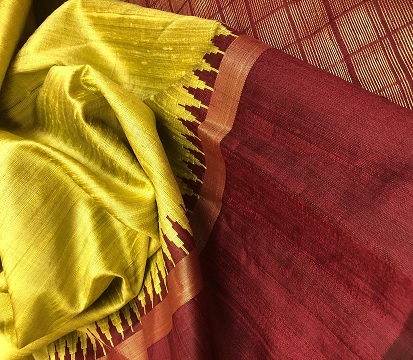SIGN UP FOR NEWSLETTER
Be the First to Know. Sign up to newsletter today

Tussar silk is also known as Kosa silk and is produced from the larve of silkworms. Tussar silk sarees has a rich texture and a deep golden colour. Varieties of tussar silk are produced in South East Asian countries such as India, Japan, China and Sri Lanka.
Available at Delhi:- Prapun, Raw Silk, Kilol, Ambapali Bihar Emporium, Kalpana Sarees, Mrignayani, Tulsi by Neeru Kumar – Emporio Mall
Indian Silk House, Kanishka’s, Vermilion, Kalika, K. Bhojraj, Sanskriti, Srijon Boutique, Mourya Boutique, Rupahali Sarees, Meera Basu, Saarang
Available at Chennai :- Rangoli, Tulsi silks, Varsidhi, Signoraa Sarees, Kilol, Gaurang, A.S. Babu Sah, Kay Fashions, Man Mandir, Fabindia, Samasta in Alwarpet
Shops in Bangalore :- Janardhana Silk House, Priya-Simran’s, Tamana, Gaurang, Sudarshan Family Store, Fabindia, Fazals and sons, Darbari
Further, India is a large producer of tusser silks. Bihar, Jharkand, Chattisgarh and West Bengal produce Tussar silk sarees. It has a dull sheen. Bhagalpur in Bihar is an important centre for tussar silk sarees and fabrics. Weaving is done by the Devangan community. These sarees radiate a natural brilliance due to the fibre used. Tussar silk sarees are very popular in WestBengal & Bihar.
Tussar is dyed with vegetable colours. In addition, thread work or minimum zari work is also done on tussar sarees. Tussar silk suit pieces are also available.
For instance, Tussar silk is also used to make the Pattachitra, which is a traditional cloth based scroll painting. As a matter of fact, Tussar silk weaving industry is more than a century old. It is a handloom industry.
Be the First to Know. Sign up to newsletter today
181 views